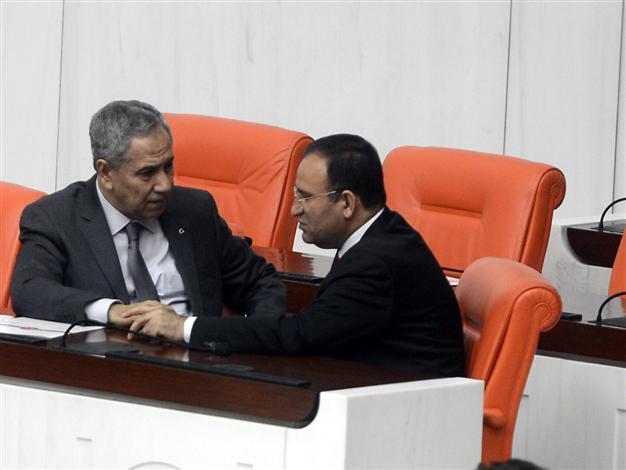Judicial bill will pass if no consensus reached on Constitution, justice minister says
ANKARA

Justice Minister Bekir Bozdağ (R) talks with Deputy PM Bülent Arınç during a Parliament session. AA photo
A controversial draft bill, criticized for increasing the government’s power on the justice system, will pass at the General Assembly and become law if the four political parties in Parliament fail to reach a consensus over the Constitutional amendment.The amendment is expected to include changes in the draft bill, according to the justice minister.
“If no consensus is reached, then we are prone to take steps in line with the consensus. If no consensus is reached over the Constitution’s 159th Article, then we are planning to enforce this [bill on justice system] as law before Parliament enters into break,” Justice Minister Bekir Bozdağ told reporters before the ruling Justice and Development Party (AKP) parliamentary group meeting Jan. 28.
Article 159 states the HSYK must be established and exercise its functions in accordance with the principles of the independence of courts and the security of tenure of judges.
On Jan. 24, Turkish Prime Minister Recep Tayyip Erdoğan said they will freeze some articles of the controversial bill to reshape the Supreme Board of Judges and Prosecutors (HSYK), also adding the government had no intention of entirely withdrawing the bill.
Bozdağ, however, said yesterday that the bill will pass from the General Assembly with some changes.
“Will it pass the way it is now? This depends on the General Assembly’s decision but I guess there will be some changes [to the bill]. There may be significant changes. Some articles might be removed,” said Bozdağ Jan.. 28.
Prime Minister Recep Tayyip Erdoğan had suggested constitutional changes as an alternative to a new law that would tighten government control over the judiciary, which he believes is using the corruption investigation to undermine him. However, the effect may ultimately have been similar, though the process would take longer.
The HSYK is the bull’s eye in Erdoğan’s campaign against the judiciary, as he has strongly maintained the HSYK has been infiltrated by followers of the reclusive U.S.-based Islamic scholar Fethullah Gülen, thus creating a “parallel state” apparatus in Turkey. The prime minister has claimed his action serves to restore judicial independence.
A massive graft investigation, which was launched last month and has implicated four ministers, has touched off a struggle for control of the judiciary, as the government has moved to increase its control over the key judicial body in a bid to head off similar probes in the future.
















